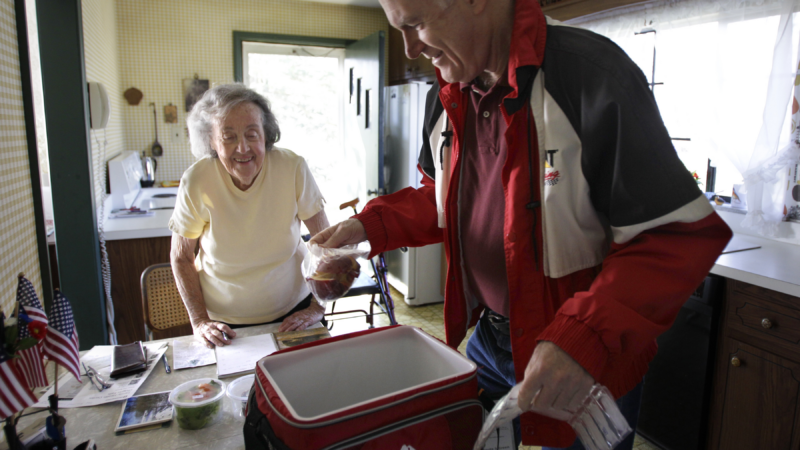HHS layoffs hit Meals on Wheels and other services for seniors and disabled
The layoffs at the Department of Health and Human Services slashed the staffs of major federal aging, disability and anti-poverty programs, leaving the future of those programs uncertain.
At least 40% of staff got layoff notices and many were turned away at the front door Tuesday when they showed up for work at the Administration for Community Living, or ACL, which coordinates federal policy on aging and disability. That’s according to the agency’s former director under the Biden Administration, Alison Barkoff, who says she talked to multiple members of her former staff.
The agency funds programs that run senior centers and distribute 216 million meals a year to older and disabled people through the Meals on Wheels program.
“The programs that ACL implements improve the lives of literally tens of millions of older adults, people with disabilities and their families and caregivers,” says Barkoff, now director of a health law program at George Washington University’s Milken Institute School of Public Health. “There’s no way to have these RIFs and not impact the programs and the people who rely on them.”
Last week, the announcement of the coming layoffs at HHS said that ACL’s responsibilities would go to different parts of HHS.
But Project 2025, the Heritage Foundation’s guide for reshaping government, had suggested ACL take on work on special education services once the Department of Education was dismantled. It’s not clear where that work will be done now.
In addition, every staffer was laid off from the Division of Energy Assistance, according to two employees who lost their jobs on Tuesday, Andrew Germain and Vikki Pretlow. The office runs the Low-Income Home Energy Assistance Program, or LIHEAP, which helps 5.9 million low-income households pay heat and cooling bills and pay for home repairs to boost energy efficiency.
The staffers said layoffs of about 20 workers came as a surprise and they expressed concern about whether the program would continue once funding runs out at the end of September and impoverished people face rising heating bills in fall and winter.
LIHEAP provides “life-saving services,” says Germain. One way the funds are used is to help low-income people pay their electric bills when they rely upon oxygen or other medical devices or need to keep the refrigerator running to store insulin or other medicines.
Germain ran compliance monitoring to make sure states used the LIHEAP money correctly. He said fraud is rare. But LIHEAP was scrutinized by Project 2025. It noted a “loophole” – fixed by Congress more than ten years ago, in 2014 – that was used by about 10 states to give minimal energy assistance in a way that then qualified impoverished people for a bigger SNAP, or food stamp, payment.
Congress appropriated $4.1 billion to LIHEAP in fiscal year 2024. Germain says without federal staff to run the program, it’s unclear how it will continue after the current appropriation ends in September.
Pretlow, who lost her job as a program specialist in the LIHEAP office, said: “You can be paid much more in a different place, you can be praised more in a different place, you can be appreciated more in a different place. But the people I worked with have a great heart for service.”
Dozens presumed dead in fire at Swiss Alps bar during New Year’s celebration
Dozens of people are presumed dead and about 100 injured, most of them seriously, following a fire at a Swiss Alps bar during a New Year's celebration, police said Thursday.
Warren Buffett officially retires as Berkshire Hathway’s CEO
The legendary 95-year-old investor spent decades building his company into one of the world's largest and most powerful. Now Greg Abel is taking it over.
Crypto soared in 2025 — and then crashed. Now what?
For most of 2025, cryptocurrencies such as bitcoin surged as President Trump vowed to make the U.S. a crypto leader. But now, a severe sell-off has shaken the sector.
Zohran Mamdani sworn in as New York City mayor, capping historic rise
Mayor Zohran Mamdani took the oath of office in New York City after midnight Thursday. The city's first Muslim mayor, a member of the Democratic Socialists of America, has promised to focus on affordability and fairness.
Rising from the ashes, a symbol of hope at the Rose Parade
Survivors of the Eaton and Palisades Fires find healing and community working on a Rose Parade float to honor the lives and communities lost in last year's wildfires.
The history behind the NYC subway station chosen for Mamdani’s swearing-in
The city shut down the station in 1945 on New Year's Eve. Eighty years later, it's a symbolic venue choice for the incoming mayor's private swearing-in ceremony.







